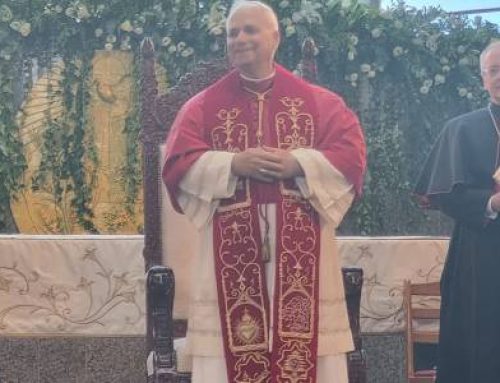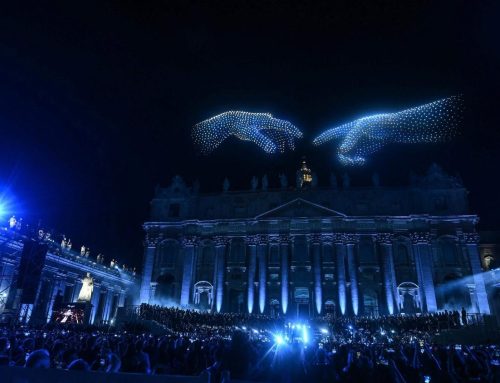INTERVIEW – With the start of the new decade 2020, many painful and unfortunate events occurred throughout the world, starting with the fires in Australia, followed by the spread of the coronavirus, the Persian-Gulf crisis, and various natural disasters, accidents, the Beirut blast, the California fires, and other disastrous events. All have left people live in hopelessness and fear. The consequences of those events and the spread of COVID-19 left most people unemployed and without hope.
Yet, Fr. Firas Abedrabbo addresses the matter from a biblical point of view and answers on how the faithful can find both the earthly hope and the spiritual joy, despite all hardships.
How does the Holy Bible guide us through tough times?
As Christians, we believe that the Holy Bible is “actually is, the Word of God” (1 Thessalonians 2:13). It is a collection of texts or books through which God speaks to us, where we can find the history, the journey, the experience, the reflection, the prayers, and the questions of our predecessors. Thus, Christians’ reflection on their reality may be considered a general one that differs from that of historians, politicians, or scientists, one that is “in light of faith in God.”
The Holy Bible is full of verses that talk about hope. The internet makes it easier for us to find them, but what is more important is the “history” behind them; the History of Salvation, where God keeps His promise and will not leave whoever depends on Him.
I want to talk about two types of “hope.” One has a human dimension while the other relates to Providence. Today, although our hope in man, mostly political and religious leaders, is weak and shaken, we, as believers, hold on to hope and know that God opens a new door where all doors seem to be closed.
Hope, then, is rooted in faith, and faith grounded on the love we have for God, and our love for God established on our first discovery of His love for us, which appears in the life of each of us distinctly and especially called “the experience of God’s presence in our life.” That alone is the source of hope. That is what the Bible unfolds from Genesis to Revelation.
And who is the Holy Spirit?
He is the Spirit of God who was sent by Jesus Christ, post-resurrection, from the Father to His apostles and the early Church, during the darkest times. He is the Spirit of truth, the Counselor, and Comforter. The Spirit leads the Church and inspired the writing of the Holy Bible, which speaks to us: “the Spirit helps us in our weakness. We do not know what we ought to pray for, but the Spirit himself intercedes for us through wordless groans.” (Romans 8:26) Therefore, He is the source of life and regenerates it within the baptized.
Is not this enough evidence for the Holy Spirit to be the stimulator of hope in our Christian life? He is what nourishes the seeds of divine love and faith, which turns to be hope, dependence, and surrender to God.
Unfortunately, this is what we lack in our so-called traditional, mainline churches. Our dependence on the institution outweighs reliance on God Himself because we are no longer faith-filled Christians. Many are merely members of an institution that makes us feel safe because it seems rich or powerful or ancient. That is all an illusion, and I would dare to call it “polytheism.”
How can one be a source of hope in his/her surroundings?
I would not say I like to use the word “optimism” as it may sound superficial and somehow random. Optimism can relate to hope on the human level, which lacks certainty and is full of expectations and aspirations. It’s a way to calm us by substituting negative ideas with positive ones, even though they could be disconnected from reality. It has a numbing effect only. Yet, what I prefer to use is the word “joy.” Joy is more profound than mere optimism. It is a deep feeling of contentment, peace, and certainty based on “hope”: “because you will not abandon me to the realm of the dead, nor will you let your faithful ones see decay.” (Psalm 10:16), and which is all based on faith and a deep relationship with God.
To be is a source of hope as Christians. It is to live and witness the joy of hope and to believe that “our present sufferings are not worth comparing with the glory that will be revealed in us.” (Romans 8:18). Saint Paul adds: “Not only so, but we ourselves, who have the first fruits of the Spirit, groan inwardly as we wait eagerly for our adoption to sonship, the redemption of our bodies. 24 For in this hope we were saved. But hope that is seen is no hope at all. Who hopes for what they already have? But if we hope for what we do not yet have, we wait for it patiently.” (Romans 8: 23-25).
Of course, whoever has this love, faith, and hope, will automatically move to “act on them,” and this is reflected by each one’s talents and abilities, by listening to one’s heart and using one’s mind.
By: Rula Shomali
Source: Latin Patriarchate of Jerusalem






